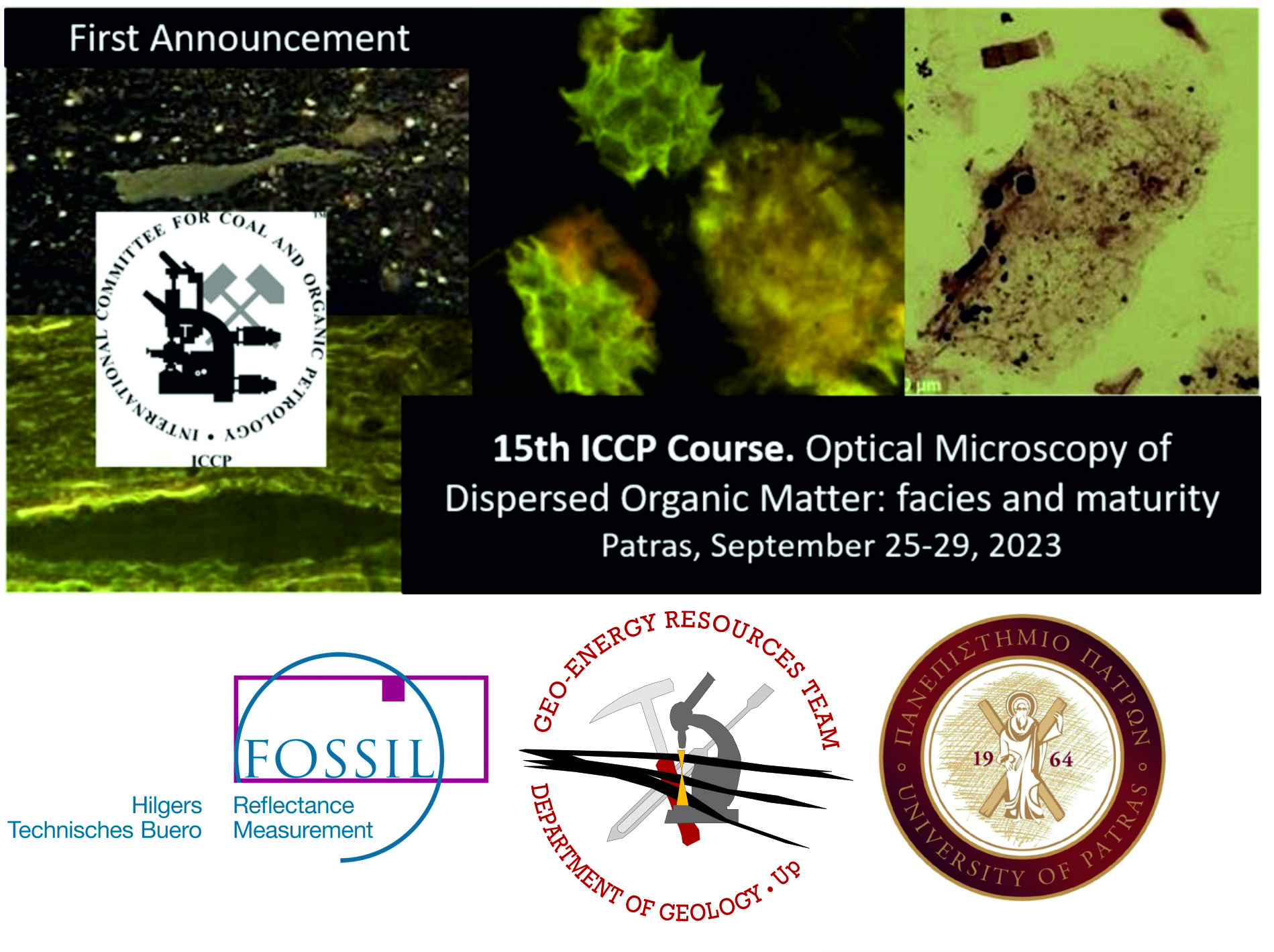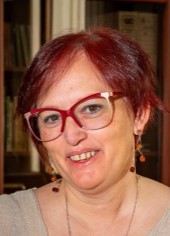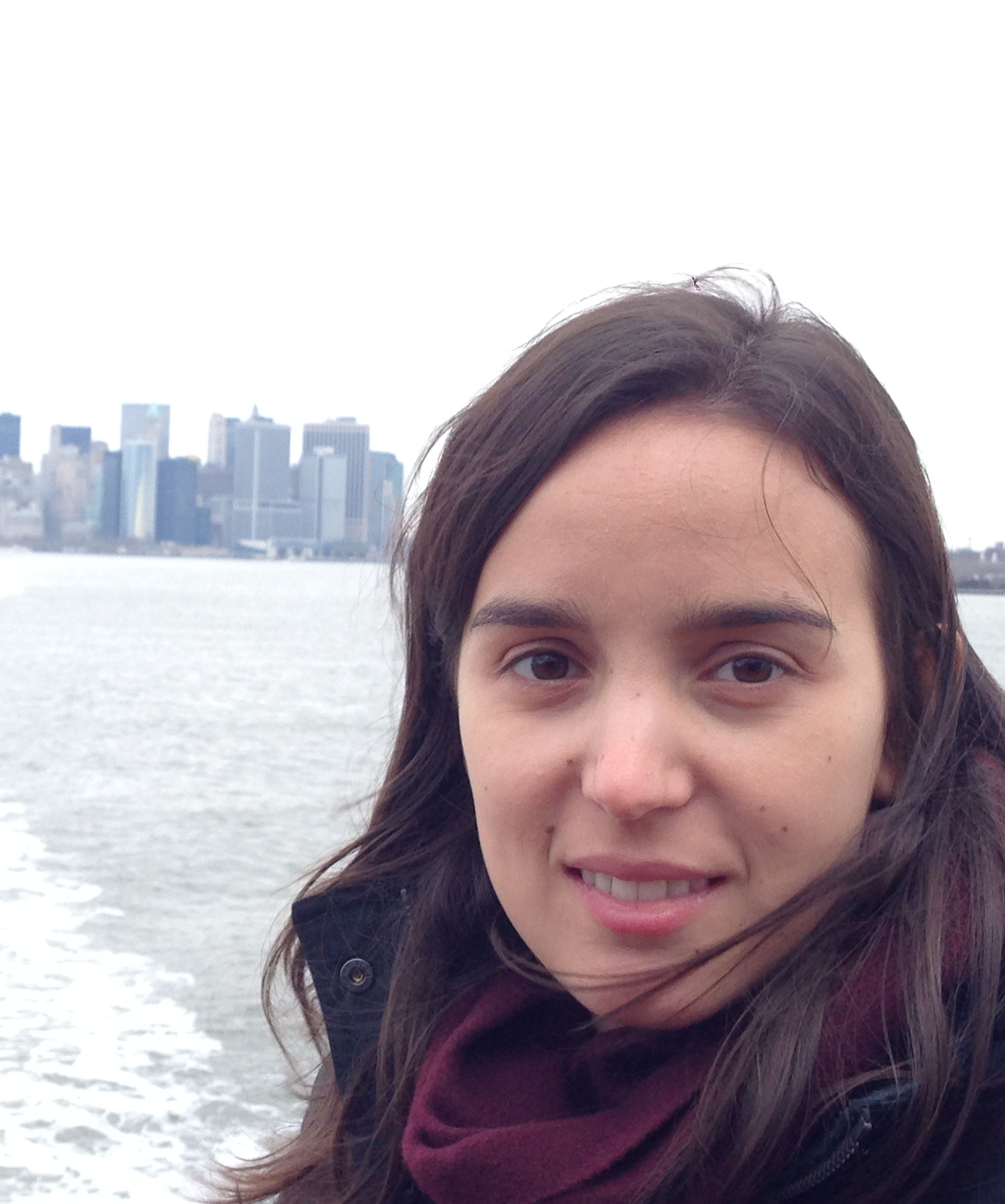15th ICCP Course: Optical Microscopy of Dispersed Organic Matter: facies and maturity, PATRAS 2023
| April 2, 2023 | Filled under Courses, News |
|

1. Introduction
The International Committee for Coal and Organic Petrology (ICCP), in conjunction with the Department of Geology, University of Patras, is pleased to announce a training course in Optical Microscopy of Dispersed Organic Matter to be held in Patras, Greece between 25-29th September 2023.
The course is designed for professionals and students, and is not exclusively targeting organic petrologists but also those, who rather deal with petrographic data.
The course is centred on the petrology of dispersed organic matter both under transmitted and reflected light with particular emphasis in the integration of the information from both observation modes. The course will cover identification of palynofacies components, macerals and procedures for the quantification of the different components. Challenges and common mistakes will be covered. Estimation of source rock maturity, geochemical and optical parameters, identification of vitrinite and measurement of vitrinite reflectance will be stressed.
Update! Due to a last minute obligation of Prof. João Graciano Mendonça Filho, instructors will be Dr Angeles G. Borrego and Dr. Carolina Fonseca.
2. Course outline
The course will be held daily (25-29th September) from 9:00 a.m. until 5:00 p.m., with breaks for morning and afternoon coffee/tea, and lunch.
The following items will be covered in the course:
1. Dispersed Organic Matter (DOM): Concepts and definitions
OM production, processes and sedimentation
OM evolution. Physicochemical transformation during maturation
2. Transmitted and reflected light microscopy techniques (white and blue lights)
Sample preparation, modes of illumination, qualitative and quantitative procedures
3. Palynofacies. Identification and classification of components. Interpretation of results.
4. Identification and quantification of macerals and components
5. Maturity of organic matter: SCI-Spore Colour Index; spectral fluorescence parameters. Vitrinite reflectance measurement. Identification of indigenous vitrinite. Interpretation of results
6. Organic facies and case studies
7. Emphasis will be given to practical exercises. Practical session facilities will be provided by Hilgers Technisches Büro, using a microscope coupled to an image projector equipped with FOSSIL software for reflectance measurement, documentation and training.
One full afternoon at least will be devoted to questions and problems in the materials the participants are dealing with in their research or technical works. The format will be as slide show to share and also the samples can be brought to the practical sessions.
Related activities: The course will take place right after the 2023 Joint 74th ICCP and 39th TSOP Meeting in the same location, therefore participants will have the chance to attend the fieldtrips organized around the meeting and the symposium sessions.
3. Registration and fees
Registration is now open
Costs for the course include course notes, lunches and coffee-breaks. Cost for the course excludes travel, accommodation and meals other than during the course. The number of participants is limited to 20.
Registration is now available.
Due date for registration and payment is August 30th, 2023. A detailed outline of the course will be available on the website closer to the course.
Company / Professional: 1300 €
Government / Non-Profit: 750 €
Student: 250 €
Pay either by Bank Transfer to:
Bank Name: Commonwealth Bank of Australia Address: 48 Martin Place, Sydney, NSW 2000, Australia
Account Name: International Committee for Coal and Organic Petrology BSB: 064107
Account Number: 10409339 Swift Code: CTBAAU2S
Reference: your surname and 15th ICCP Course.
Or Contact ICCP’s Treasurer Dr. Joan Esterle j.esterle@uq.edu.au for Credit card payments. Receipt will be sent upon payment.
4. Accommodation
Participants will have to arrange their own accommodation. However, the organizers arranged special prices with the following Hotels:
-
-
- Castello Hotel (https://castellohotel.gr/) in walking distance to the Venue.
- Astir Hotel (http://www.hotelastirpatras.gr/patras-hotel/index.html), in city center (please quote code 15th ICCP Course).
- Moxy Patra Marina (https://moxy-hotels.marriott.com/; reservations@moxypatra.com) in city center .
-
For any assistance please contact Dr. Stavros Kalaitzidis (skalait@upatras.gr).
5. Venue
Conference and Cultural Centre, University of Patras University Campus, 26504Rio-Patras
Please note the University Campus is located about 7 km from the city center. There are regular buses and the cost of a taxi is about 8 Euros one way (about 15- 20 min drive).
6. Trainers
Dr. Angeles Borrego
Angeles G. Borrego is Scientific Researcher at the Instituto Nacional del Carbón (INCAR-CSIC) in Oviedo, Spain. She got the PhD from the University of Oviedo in Spain in 1992 after having performed short stays at the NRG on fossil fuels and environmental geochemistry in Newcastle upon Tyne (UK), and the University of Bergen (Norway). She worked for nearly three years at the Lehrstuhl from Erdöl und Kohle (RWTH Aachen), Germany with a Marie Curie postdoctoral fellowship. Her research has mainly focused on the study of oil shale and source rocks with special emphasis in the relationships between organic petrology and geochemistry, the petrographic characteristics of chars and the behavior of macerals upon pyrolysis, and more recently on peat as record of palaeo- environmental variability. This research has been carried out within the framework of national and international projects and has yielded over 90 papers in peer reviewed journals. Angeles gives some classes at the University of Oviedo and has taught compact organic petrology courses for coal and oil companies and at the Federal University of Rio Grande do Sul (Porto Alegre, Brazil), Universidad Pedagógica y Tecnológica de Colombia (Sogamoso) and Universidad Autonoma de Coahuila (Mexico) in addition to the ICCP course on Dispersed Organic Matter in 2014 and 2017 and the General Organic Petrology Course in 2016 and 2022.
Dr. Carolina Fonseca
Dr. Carolina Fonseca is Bachelor in Geology from the University of Coimbra, Portugal (2014), Master in Geosciences (University of Coimbra, Portugal, 2016) and PhD in Earth and Solid Planets Sciences (Université de Toulouse III – Paul Sabatier, France, 2020). During her Master and PhD, Dr. Carolina Fonseca had several stays at the Palynofacies and Organic Facies (LAFO) and Petroleum and Environmental Geochemistry (LAGEPA) Laboratories of the Federal University of Rio de Janeiro (UFRJ), Brazil. She had teaching experiences at Université de Toulouse and the University of Porto (Portugal), where she is a regular invited speaker in the areas of Organic Petrology and Paleoenvironments. Between 2021 and 2022 she was an Invited Professor at the University of Minho (Portugal), teaching several graduate and post-graduate courses. In addition, she is currently supervising and mentoring MSc students from the post-graduation program of UFRJ. Her main research interests focus on organic petrology and geochemistry applied to the study of Oceanic Anoxic Events, being a specialist in palynofacies and paleoenvironmental reconstruction. Has several publications in international peer-reviewed journals, having participated and been the co-leader of national and international R&D projects (IUGS/UNESCO and CNRS). She is member of several scientific societies such as ICCP (International Committee for Coal and Organic Petrology) and TSOP (The Society for Organic Petrology). Within the ICCP, she is an active participant of several Working Groups and accredited in the Dispersed Organic Matter Vitrinite Reflectance Accreditation Program (DOMVR). Also, she currently holds the position of Councilor in TSOP. Since 2022, she is a postdoctoral fellow at the Palynofacies and Organic Facies Laboratory (LAFO) and the Sedimentary Geology Laboratory (Lagesed) of UFRJ (Brazil) within the R&D Project PRESAL-II, funded by Shell Brazil, with a grant focusing on the organic facies variability of the pre-salt interval of the Santos Basin.
For further Information please contact
Dr. João Graciano Mendonça Filho at graciano@geologia.ufrj.br or
or Dr. Stavros Kalaitzidis skalait@upatras.gr
